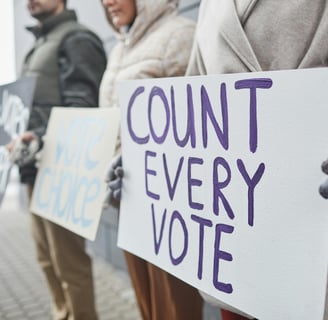Voter Responsibility: How Individual Participation Shapes Democracy
1/6/20253 min read


Democracy thrives on the active participation of its citizens. But why is it so important for individuals to take their roles as voters seriously? The strength of a democracy lies in the collective actions of its people, and voting is the cornerstone of this process. By fulfilling their responsibilities, voters not only influence governance but also ensure that the democratic system remains fair, transparent, and representative.
This blog explores the key duties of voters and how their active participation shapes the future of democratic societies.
1. How Can Staying Informed Strengthen Democracy?
An informed electorate is the backbone of a robust democracy. But what does it mean to stay informed, and why does it matter?
Staying informed involves understanding the issues at stake, the policies proposed by candidates, and the implications of these policies on the community and nation. It requires voters to seek information from credible sources, critically analyze news, and engage with different perspectives. This level of awareness empowers voters to make decisions that align with their values and the greater good.
When voters are informed, they hold leaders accountable, demand transparency, and ensure that their choices reflect thoughtful deliberation rather than superficial influences. This, in turn, strengthens democratic institutions by promoting governance that is responsive to the needs of the people.
2. Why Is It Important to Evaluate Candidates Critically?
Elections are about choosing representatives who will shape the policies and direction of a nation. How can voters ensure they make the best choice?
Evaluating candidates critically involves examining their track records, qualifications, and proposed policies. Voters should ask questions such as: What are the candidate’s achievements? Do their values align with the needs of the community? Are their promises realistic and backed by actionable plans?
Beyond promises, voters should also scrutinize candidates’ behavior, ethics, and ability to address pressing issues. Avoiding biases and focusing on facts ensures that voters select leaders based on merit rather than rhetoric or charisma. This critical evaluation helps elect representatives who are capable, trustworthy, and committed to serving the public interest.
3. How Does Active Participation in Elections Shape Democracy?
Casting a vote is the most direct way citizens can influence the democratic process. But what impact does active participation have?
When individuals participate in elections, they contribute to the legitimacy of the democratic system. High voter turnout ensures that elected leaders truly represent the will of the people, reducing the risks of disproportionate influence by a small segment of the population. It also demonstrates a collective commitment to the principles of democracy, fostering trust in the electoral process.
A political consulting company creates voter awareness by crafting targeted campaigns, leveraging digital platforms, organizing community events, and delivering clear, impactful messages to educate and engage citizens in the democratic process.
4. What Are the Consequences of Neglecting Voter Duties?
While the importance of voter responsibilities is clear, what happens when citizens neglect their roles in the democratic process?
Low voter turnout and uninformed voting can lead to governance that does not reflect the majority’s will. It opens the door to unaccountable leaders and policies that may not address public needs. Neglecting voter duties can also erode trust in democratic institutions, making societies vulnerable to corruption, authoritarianism, and political instability.
Additionally, when citizens abstain from voting or fail to engage critically, they miss the opportunity to influence policies that directly impact their lives. Democracy becomes weaker when its citizens remain passive, diminishing its ability to adapt and address contemporary challenges.
5. How Can Citizens Embrace Their Role as Responsible Voters?
Taking voter responsibilities seriously is not just a duty but a privilege. So, how can individuals actively embrace their role in shaping democracy?
Educate Yourself: Stay updated on current events, policy debates, and election processes. Use reliable sources and verify information before forming opinions.
Engage in Dialogue: Participate in discussions with diverse groups to understand different perspectives. This broadens your outlook and helps make balanced decisions.
Get Involved: Support causes, volunteer for campaigns, or join local political organizations. Grassroots participation enhances your connection to the democratic process.
Encourage Others: Inspire friends and family to vote and engage in civic duties. Collective efforts amplify the impact of individual actions.
Vote Thoughtfully: On election day, cast your vote with confidence, knowing that you’ve considered the implications of your choice.
By embracing these practices, citizens can become active contributors to a thriving democracy, ensuring that their voices are heard and their rights are upheld.
Conclusion: Why Does Voter Responsibility Matter?
Voter responsibility is the lifeblood of democracy. Staying informed, critically evaluating candidates, and actively participating in elections are fundamental ways citizens contribute to the democratic process. When voters fulfill their duties, they not only shape the future of governance but also uphold the values of freedom, equality, and representation.
In a world where democracy faces challenges from various fronts, the role of responsible voters becomes even more crucial. By taking their responsibilities seriously, individuals ensure that democracy remains resilient, vibrant, and capable of addressing the needs of all its citizens.
